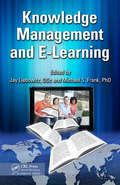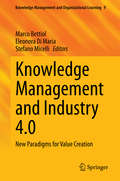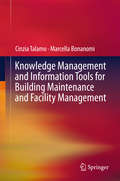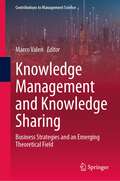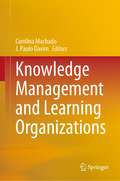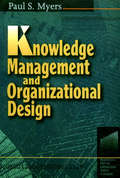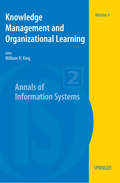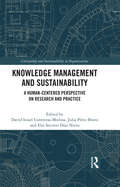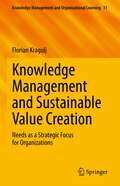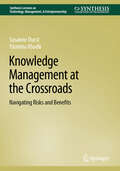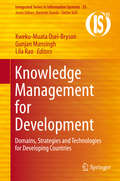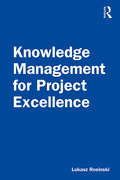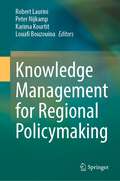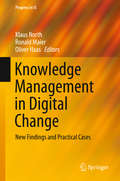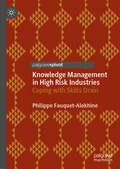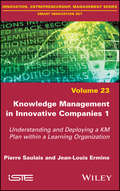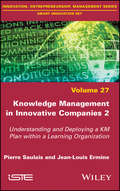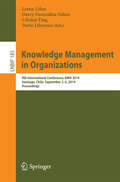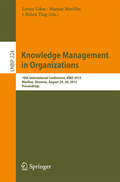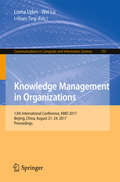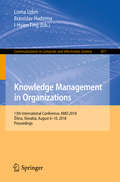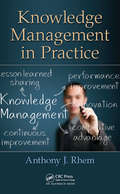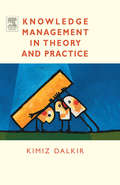- Table View
- List View
Knowledge Management and E-Learning
by Jay Liebowitz Michael S. FrankThe rapidly growing demand for online courses and supporting technology has resulted in a plethora of structural and functional changes and challenges for universities and colleges. These changes have led many distance education providers to recognize the value of understanding the fundamental concepts of both e-learning and knowledge management (K
Knowledge Management and Industry 4.0: New Paradigms for Value Creation (Knowledge Management and Organizational Learning #9)
by Eleonora Di Maria Marco Bettiol Stefano MicelliThe book discusses the opportunities and challenges of managing knowledge in the new reality of Industry 4.0. Addressing paradigmatic changes in value creation due to the development of digital technologies applied to manufacturing (additive manufacturing, IoT, robotics, etc.), it includes theoretical and empirical contributions on how Industry 4.0 technologies allow firms to create and exploit knowledge. The carefully selected expert contributions highlight the potential of these technologies in acquiring knowledge from a larger number of sources and examine approaches to innovation, organization of activities, and stakeholder development in the context of this next industrial revolution.
Knowledge Management and Information Tools for Building Maintenance and Facility Management
by Cinzia Talamo Marcella BonanomiThis book describes the latest methods and tools for the management of information within facility management services and explains how it is possible to collect, organize, and use information over the life cycle of a building in order to optimize the integration of these services and improve the efficiency of processes. The coverage includes presentation and analysis of basic concepts, procedures, and international standards in the development and management of real estate inventories, building registries, and information systems for facility management. Models of strategic management are discussed and the functions and roles of the strategic management center, explained. Detailed attention is also devoted to building information modeling (BIM) for facility management and potential interactions between information systems and BIM applications. Criteria for evaluating information system performance are identified, and guidelines of value in developing technical specifications for facility management services are proposed. The book will aid clients and facility managers in ensuring that information bases are effectively compiled and used in order to enhance building maintenance and facility management.
Knowledge Management and Knowledge Sharing: Business Strategies and an Emerging Theoretical Field (Contributions to Management Science)
by Marco ValeriThis book contains a collection of chapters that provide new insights into traditional paradigms, approaches, and methods, as well as more recent innovative studies in knowledge management. It investigates the historical root of such interaction and how it evolved over time. The book examines the ability of an organization to recognize the value of new external information and knowledge, assimilate and apply them, which plays a critical role in determining innovative output. It introduces and highlights the importance of knowledge-sharing performance. In particular, it analyzes the knowledge-sharing process and its impact on the innovation capability and innovation performance of the firms. The book is an interesting read for both researchers and practitioners in this field.
Knowledge Management and Learning Organizations
by J. Paulo Davim Carolina MachadoThis book focuses on knowledge management and learning organizations, showing how they realise entrepreneurship and innovation. Understanding knowledge management as the process of creating, sharing and managing an organization’s information and knowledge, and focusing learning organizations in their collaborations to promote continuous learning are two issues that are critical to the organizational success. As such, this book offers insights into the topic and the appropriate use of the tools and strategies that drive competitive organizations operating on an international or transnational scale.
Knowledge Management and Organisational Design (Resources For The Knowledge-based Economy Ser.)
by Paul S MyersThe first in the readers' series called Resources for the Knowledge-Based Economy, Knowledge Management and Organizational Design is a unique compilation of articles and book excerpts that describe how the management of an organization shapes the levels of knowledge transfer, innovation and learning. The collection draws on fifty years of management thinking and presents key issues facing knowledge-intensive organizations. The selections are concise, clearly written and present a rich framework of examples drawn from real management experience. Arranged thematically, the chapters discuss decision-making, organization structure, innovation, strategic alliances, managing knowledge workers and power relations. Represented in this volume are the ideas of influential academics including the late economist Frederick Hayek and French sociologist Michael Crozier, as well as world-renowned management thinkers such as Harvard Business School Professor Rosabeth Moss Kanter and Charles Handy.
Knowledge Management and Organizational Learning
by William R. KingKnowledge management (KM) is a set of relatively-new organizational activities that are aimed at improving knowledge, knowledge-related practices, organizational behaviors and decisions and organizational performance. KM focuses on knowledge processes--knowledge creation, acquisition, refinement, storage, transfer, sharing and utilization. These processes support organizational processes involving innovation, individual learning, collective learning and collaborative decision-making. The "intermediate outcomes" of KM are improved organizational behaviors, decisions, products, services, processes and relationships that enable the organization to improve its overall performance. Knowledge Management and Organizational Learning presents some 20 papers organized into five sections covering basic concepts of knowledge management; knowledge management issues; knowledge management applications; measurement and evaluation of knowledge management and organizational learning; and organizational learning.
Knowledge Management and Sustainability: A Human-Centered Perspective on Research and Practice (Citizenship and Sustainability in Organizations)
by Contreras-Medina, David IsraelBased on the importance of human beings as creators and managers of knowledge towards the achievement of sustainability in the current digital age, this book is an effort to present many studies taking individuals as centers of knowledge and starting points for environmental, social, and economic development. From various theoretical and empirical studies developed by researchers from Mexico, Colombia, and Brazil, this book presents, in an ordered sequence, the individual as the creator of knowledge, the role of human beings as knowledge managers with and for sustainability, the opportunities for knowledge sharing in virtual research collaborations for sustainability, and the advantages and disadvantages with and for sustainability from a human-centered perspective in the digital era. Moreover, this text describes the antecedents of competitive advantage in a sustainable cooperative network, knowledge management in technology projects, an empirical study of knowledge management of tutorial intervention, a model of processes and knowledge management to increase competitiveness, the role of Information and Communication Technologies (ICT) for managing sustainable practices, finishing with knowledge management trends with and for sustainability, from a human-centered perspective in the digital era. Offering an innovative approach, this book seeks to expand the understanding of the theme of knowledge management and sustainability from the perspective of the human resource as a generator of knowledge. There is mounting focus on knowledge-intensive work and sustainable development in the corporate world. In light of these trends, this edited volume will be of value to researchers, academics, professionals, and advanced students in the fields of management, environment and sustainability, and development studies.
Knowledge Management and Sustainable Value Creation: Needs as a Strategic Focus for Organizations (Knowledge Management and Organizational Learning #11)
by Florian KraguljOrganizations are increasingly recognizing the importance of sustainability and responsibility. They are challenged to develop a holistic approach to value creation that reconciles economic, social, and environmental goals. This book describes how knowledge can facilitate this process and amplifies the idea of knowledge management to strategically serve multiple stakeholders in a sustainable and responsible way. In particular, the book introduces the concept of the "Need Knowledge-Driven Organization." It builds on mature research on organizational purpose, stakeholder theory, and phronesis, and advances the concept of "needs." This provides a new lens for understanding the sustainable and responsible business case: First, people are motivated by their needs, and organizations represent social structures that facilitate the satisfaction of shared needs. Second, needs reflect and combine social, environmental, and economic concerns, making sustainability and responsibility more realizable for practitioners. And third, needs provide a reference point for holistic value creation and can thus align knowledge processes and structures in organizations.
Knowledge Management at the Crossroads: Navigating Risks and Benefits (Synthesis Lectures on Technology Management & Entrepreneurship)
by Susanne Durst Yasmina KhadirThis is the most up-to-date book on knowledge management. It covers the principles of knowledge management and translates them to actionable strategies and concrete suggestions. It highlights a novel knowledge management approach that is based on collaboration and inclusiveness that aims to address present risks and future challenges at the societal level. The book is written in a way that makes this important topic accessible to a broad readership.
Knowledge Management for Development
by Kweku-Muata Osei-Bryson Gunjan Mansingh Lila RaoA number of developing countries, including small island states have common problems that have affected their development and growth. Knowledge Management (KM) initiatives can be used to address some of these issues, but these developing countries need to understand what is needed to implement them, in order to improve economic conditions. While many of these countries have access to technologies that can be used to assist in knowledge management, relevant and low cost KM initiatives need to be considered in improving their existing KM processes. Sectors critical to the growth of these developing countries include health care, crime management, disaster recovery management, small and medium size enterprise development. Knowledge Management for Development: Domains, Strategies and Technologies for Developing Countries highlights the opportunities in these sectors and provides advice as to how these countries should go about understanding, building and adopting the relevant KM strategies and technologies. This book identifies appropriate technologies which should be considered to increase productivity within the identified sectors in the developing countries and also sectors in where knowledge management initiatives can yield maximum value. It also considers the constraints of these territories, recommending appropriate technologies and strategies for KM initiatives. It provides advice on how these technologies should be adopted in these sectors of developing countries. Investing in these strategies should benefit these countries development and growth.
Knowledge Management for Project Excellence
by Lukasz RosinskiKnowledge Management for Project Excellence defines a methodology, called Projects with Learning Outcomes (ProwLO), for management of knowledge in projects, including a process model. This guide enables organizations to solve many known knowledge management problems as experienced in practice. The process model consists of eight processes, which are in turn made of activities. These processes are aligned with the generic life cycle of projects and programmes. They drive knowledge processes in project environments. ProwLO is a tool to institutionalize knowledge processing and optimize knowledge processes, and thereby provides the infrastructure for the development of learning organizations. This book, as a methodology, provides a lot of contextual information for a better understanding of knowledge management in the context of projects. First of all, it provides an understanding of the essence of knowledge. Second, examples of knowledge needs are provided in the context of two PRINCE2 processes and risk management. Third, it provides extensive background information on project management. This book offers a step-by-step guide to executing successful project management in the context of the key processes. It also provides the reader with a decision-making tool, supported by the capture of Cases, a key experience knowledge type. As such, it is an essential tool for any project manager operating in the knowledge economy.
Knowledge Management for Regional Policymaking
by Peter Nijkamp Karima Kourtit Robert Laurini Louafi BouzouinaThe present publication focusses the attention on new avenues in regional information and knowledge management, while we will zoom in particularly on the potential promises and hurdles of digital technology. This digital challenge has already generated a wealth of implications in the area of smart or intelligent cities, but as yet far less has been achieved in the field of regional planning and regional science. There is clearly a need for a more systematic and wide-ranging assessment and presentation of emerging approaches and concepts in this field, for instance, in regard to principles (e.g. geographic rule modeling), methodologies (e.g. blockchain systems), data analytics (e.g. machine learning) and data governance (e.g. data sovereignty) of regional information and knowledge. Especially in our ‘big data’ era, a systematic, comprehensible and reliable acquisition, storage, sharing and handling of data (e.g. on the basis of systematic decomposition and filtering principles) is more needed than ever before. The present study seeks to present a selection of state-of-the-art contributions on advanced – often digitally-oriented – regional information and knowledge management foundations, principles and practices written by several experts in the field of spatial informatics. These contributions were collected with a view to the design of a comprehensive knowledge and research agenda, which was discussed during a brainstorm workshop in Lyon, France (October 2021). This book covers various fields of interest, such as GeoAI, knowledge modelling, IoT and scalability, space syntax, rule extraction, data governance and data self-sovereignty. It is concluded with a knowledge and research agenda outlining future endeavors in the field of the spatial information sciences (or spatial informatics).
Knowledge Management in Digital Change: New Findings And Practical Cases (Progress in IS)
by Klaus North Ronald Maier Oliver HaasThis book features both cutting-edge contributions on managing knowledge in transformational contexts and a selection of real-world case studies. It analyzes how the disruptive power of digitization is becoming a major challenge for knowledge-based value creation worldwide, and subsequently examines the changes in how we manage information and knowledge, communicate, collaborate, learn and decide within and across organizations. The book highlights the opportunities provided by disruptive renewal, while also stressing the need for knowledge workers and organizations to transform governance, leadership and work organization. Emerging new business models and digitally enabled co-creation are presented as drivers that can help establish new ways of managing knowledge. In turn, a number of carefully selected and interpreted case studies provide a link to practice in organizations.
Knowledge Management in High Risk Industries: Coping with Skills Drain
by Philippe Fauquet-AlekhineAs highly skilled workers retire, what happens to their wealth of experience? This book explores the concept of skills drain, looking at how key competencies can be identified and then transferred from experienced workers to novices. It looks at the innovative solutions managers are seeking to ensure that their workers are sufficiently trained, and then develops a protocol for doing so. Founded in academic theory, but with applications for practice, this book presents case studies and research in a valuable addition to the field of management. It will be a useful reading for academics studying high-risk industries, management and organization, as well as practitioners, managers and trainers.
Knowledge Management in Innovative Companies 1: Understanding and Deploying a KM Plan within a Learning Organization
by Pierre Saulais Jean-Louis ErmineThe status of knowledge management (KM) as a mature science has long been recognized in the academic world. However, in the economic arena, its connection with companies and organizations has been more gradual. Jean-Louis Ermine established a theoretical and practical framework for KM in his book, Knowledge Management: The Creative Loop – issued by the same publishers as this book. In this latest tome, practical examples are illustrated with real case studies. Modeled on the four-step operational approach inspired by "the creative loop", this book includes four sets of real case studies – each one following the basic presentation of the fundamental material per step. Knowledge Management in Innovative Companies 1 is especially useful for practitioners, as there are numerous illustrations based on best practices for each specific KM step and for global project implementation. Indeed, the last chapter is dedicated to the implementation of a global KM corporate project.
Knowledge Management in Innovative Companies 2: Understanding and Deploying a KM Plan within a Learning Organization
by Pierre Saulais Jean-Louis ErmineThe status of knowledge management (KM) as a mature science has long been recognized in the academic world. However, in the economic arena, its connection with companies and organizations has been more gradual. Jean-Louis Ermine established a theoretical and practical framework for KM in Knowledge Management: The Creative Loop, which was also published by Wiley. In this second volume, practical examples are illustrated with real case studies. Modeled on the four-step operational approach inspired by "the creative loop", this book includes four sets of real case studies – each one following the basic presentation of the fundamental material. Knowledge Management in Innovative Companies 2 is especially useful for practitioners, as there are numerous illustrations based on best practices for each specific KM step and for global project implementation. Indeed, the last chapter is dedicated to the implementation of a global KM corporate project.
Knowledge Management in Organizations
by Lorna Uden I-Hsien Ting Darcy Fuenzaliza Oshee Dario LiberonaThis book contains the refereed proceedings of the 9th International Conference on Knowledge Management in Organizations (KMO) held in Santiago, Chile, during September 2014. The theme of the conference is "Knowledge Management to Improve Innovation and Competitiveness through Big Data. " The KMO conference brings together researchers and developers from industry and academia to discuss and research how knowledge management using big data can improve innovation and competitiveness. The 39 contributions accepted for KMO 2014 were selected from 89 submissions and are organized in sections on: big data and knowledge management, knowledge management practice and case studies, information technology and knowledge management, knowledge management and social networks, knowledge management in organizations, and knowledge transfer, sharing and creation.
Knowledge Management in Organizations
by Lorna Uden I-Hsien Ting Marjan HeričkoThis book contains the refereed proceedings of the 10th International Conference on Knowledge Management in Organizations, KMO 2015, held in Maribor, Slovenia, in August 2015. The theme of the conference was "Knowledge Management and Internet of Things. " The KMO conference brings together researchers and developers from industry and academia to discuss how knowledge management using big data can improve innovation and competitiveness. The 59 contributions accepted for KMO 2015 were selected from 163 submissions and are organized in topical sections on: knowledge management processes, successful knowledge sharing and knowledge management practices, innovations for competitiveness, knowledge management platforms and tools, social networks and mining techniques, knowledge management and the Internet of Things, knowledge management in health care, and knowledge management in education and research.
Knowledge Management in Organizations: 12th International Conference, KMO 2017, Beijing, China, August 21-24, 2017, Proceedings (Communications in Computer and Information Science #731)
by Lorna Uden, Wei Lu and I-Hsien TingThis book contains the refereed proceedings of the 12th International Conference on Knowledge Management in Organizations, KMO 2017, held in Beijing, China, in August 2017. The theme of the conference was "Emerging Technology and Knowledge Management in Organizations." The 45 contributions accepted for KMO 2017 were selected from 112 submissions and are organized in topical sections on: Knowledge Management Models and Behaviour Studies; Knowledge Sharing; Knowledge Transfer and Learning; Knowledge and Service Innovation; Knowledge and Organization; Information Systems Research; Value Chain and Supply Chain; Knowledge Re-presentation and Reasoning; Data Mining and Intelligent Science; Big Data Management; Internet of Things and Network.
Knowledge Management in Organizations: 13th International Conference, KMO 2018, Žilina, Slovakia, August 6–10, 2018, Proceedings (Communications in Computer and Information Science #877)
by Lorna Uden I-Hsien Ting Branislav HadzimaThis book contains the refereed proceedings of the 13th International Conference on Knowledge Management in Organizations, KMO 2018, held in Žilina, Slovakia, in August 2018. The theme of the conference was "Emerging Research for Knowledge Management in Organizations."The 59 papers accepted for KMO 2018 were selected from 141 submissions and are organized in topical sections on: Knowledge management models and analysis; knowledge sharing; knowledge transfer and learning; knowledge and service innovation; knowledge creation; knowledge and organization; information systems and information science; knowledge and technology management; data mining and intelligent science; business and customer relationship management; big data and IoT; and new trends in IT.
Knowledge Management in Practice
by Anthony J. Rhem"This evidence-based book provides the framework and guidelines that professionals need for working with the contemporary explosion of data that is creating opportunities and challenges to all phases of our society and commerce." –Larry R. Medsker, Research Professor in Physics and Data Science, The George Washington University Knowledge Management in Practice is a resource on how knowledge management (KM) is implemented. It provides specific KM methods, tips, techniques, and best practices to gain competitive advantage and the most from investing in KM. It examines how KM is leveraged by first responders, the military, healthcare providers, insurance and financial services companies, legal firms, human resources departments, merger and acquisition (M&A) firms, and research institutions. Essential KM concepts are explored not only from a foundational perspective but also from a practical application. These concepts include capturing and codifying tacit and explicit knowledge, KM methods, information architecture, search, KM and social media, KM and Big Data, and the adoption of KM. Readers can visit the book’s companion website, KM Mentor (www.KMMentor.com), where they can access: Presentations by industry leaders on a variety of topics KM templates and instruction on executing KM strategy, performing knowledge transfer, and KM assessments and audits KM program and project implementation guidance Insights and reviews on KM tools Guidance on implementing and executing various KM Methods Specialized KM publications A private secure collaboration community for members to discuss ideas and get expert answers and advice
Knowledge Management in Theory and Practice
by Kimiz DalkirA new, thoroughly updated edition of a comprehensive overview of knowledge management (KM), covering theoretical foundations, the KM process, tools, and professions. The ability to manage knowledge has become increasingly important in today's knowledge economy. Knowledge is considered a valuable commodity, embedded in products and in the tacit knowledge of highly mobile individual employees. Knowledge management (KM) represents a deliberate and systematic approach to cultivating and sharing an organization's knowledge base. This textbook and professional reference offers a comprehensive overview of the field. Drawing on ideas, tools, and techniques from such disciplines as sociology, cognitive science, organizational behavior, and information science, it describes KM theory and practice at the individual, community, and organizational levels. Chapters cover such topics as tacit and explicit knowledge, theoretical modeling of KM, the KM cycle from knowledge capture to knowledge use, KM tools, KM assessment, and KM professionals. This third edition has been completely revised and updated to reflect advances in the dynamic and emerging field of KM. The specific changes include extended treatment of tacit knowledge; integration of such newer technologies as social media, visualization, mobile technologies, and crowdsourcing; a new chapter on knowledge continuity, with key criteria for identifying knowledge at risk; material on how to identify, document, validate, share, and implement lessons learned and best practices; the addition of new categories of KM jobs; and a new emphasis on the role of KM in innovation. Supplementary materials for instructors are available online.
Knowledge Management in Theory and Practice (The\mit Press Ser.)
by Kimiz DalkirFirst published in 2011. Routledge is an imprint of Taylor & Francis, an informa company.
Knowledge Management in Theory and Practice, fourth edition (The\mit Press Ser.)
by Kimiz DalkirThis thoroughly revised fourth edition of the leading knowledge management (KM) textbook offers a comprehensive and accessible overview of the theory and practice of KM.Today&’s knowledge-driven economy raises the stakes for organizations and individuals whose success depends on the effective management of information and knowledge. Knowledge is an asset that is not always easily tapped, especially when embedded in products and in the tacit understanding of highly mobile individual employees. Knowledge management (KM) represents a deliberate and systematic approach to cultivating and sharing an organization's knowledge base. This thoroughly revised new edition of the leading knowledge management textbook offers a comprehensive and accessible overview of the theory and practice of KM. Drawing on ideas, tools, and techniques from such disciplines as sociology, cognitive science, organizational behavior, and information science, it serves as an invaluable resource for students and researchers across information sciences, business, education, and communication. Global in scope and updated to reflect the maturing field, this fourth edition emphasizes optimizing KM and measuring its success and impact in meaningful ways. Fourth edition highlights: Comprehensively updated to integrate the latest theories, practices, and technologies in KMDiscusses not only how to implement but how to sustain successful KM strategies and systems in the long term Includes new coverage of KM governance and the KM ISO standard introduced in 2018Features detailed, real-world vignettes and a wealth of instructor resources, including slides and solutions
